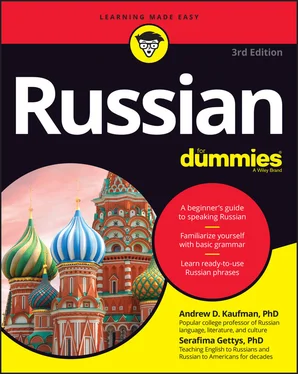Serafima Gettys - Russian For Dummies
Здесь есть возможность читать онлайн «Serafima Gettys - Russian For Dummies» — ознакомительный отрывок электронной книги совершенно бесплатно, а после прочтения отрывка купить полную версию. В некоторых случаях можно слушать аудио, скачать через торрент в формате fb2 и присутствует краткое содержание. Жанр: unrecognised, на английском языке. Описание произведения, (предисловие) а так же отзывы посетителей доступны на портале библиотеки ЛибКат.
- Название:Russian For Dummies
- Автор:
- Жанр:
- Год:неизвестен
- ISBN:нет данных
- Рейтинг книги:4 / 5. Голосов: 1
-
Избранное:Добавить в избранное
- Отзывы:
-
Ваша оценка:
- 80
- 1
- 2
- 3
- 4
- 5
Russian For Dummies: краткое содержание, описание и аннотация
Предлагаем к чтению аннотацию, описание, краткое содержание или предисловие (зависит от того, что написал сам автор книги «Russian For Dummies»). Если вы не нашли необходимую информацию о книге — напишите в комментариях, мы постараемся отыскать её.
Russian For Dummies
Russian For Dummies
Russian For Dummies — читать онлайн ознакомительный отрывок
Ниже представлен текст книги, разбитый по страницам. Система сохранения места последней прочитанной страницы, позволяет с удобством читать онлайн бесплатно книгу «Russian For Dummies», без необходимости каждый раз заново искать на чём Вы остановились. Поставьте закладку, и сможете в любой момент перейти на страницу, на которой закончили чтение.
Интервал:
Закладка:
Chapter 10features a lot more shopping vocabulary and phrases for getting help, trying on clothes, asking for specific colors, and paying for the merchandise you buy.
Exploring entertainment opportunities
Exploring new places and meeting new people are always fun. When you head out on the town, you may choose among a variety of activities. You might decide to check out a museum, a movie, or a play, for example.
 Seeing a classical Russian ballet, either in the newly renovated Bolshoy Theater in Moscow or the Mariinsky Theater in St. Petersburg, is a must for any self-respecting tourist in Russia.
Seeing a classical Russian ballet, either in the newly renovated Bolshoy Theater in Moscow or the Mariinsky Theater in St. Petersburg, is a must for any self-respecting tourist in Russia.
Going out on the town often involves making plans, buying tickets, and finding the correct seating. Chapter 11helps you navigate all these tasks in Russian.
Doing business and communicating
If you’re planning a business trip to Russia or need to speak to Russian colleagues in your home office, you should definitely see Chapter 12. There, you find common words and phrases used in an office setting. In addition, you find guidance to help you master the art of telephone conversations in Russian — and don’t forget about using computers and sending correspondence (and text messages, too)!
Enjoying sports, hobbies, recreation, and more
Hobbies can take many forms, and you may want to share information about yours with friends and acquaintances in Russian:
If you’re a sports fan, you’d better know how to talk about your favorite sports in Russian. (Also prepare to be converted into a fan of soccer or hockey — Russians’ two favorite games.)
Russians are avid readers and, for the most part, very well-read. So if you’re speaking Russian, be prepared to say at least something about books and literature genres you like or dislike. Beware: Saying “I don’t read much” can earn you a tarnished reputation.
If you happen to be in Russia in summer, late spring, or early autumn, don’t miss the experience of going to a country house on a weekend. You’ll never forget it.
See Chapter 13for more about hobbies and the great outdoors.
Getting a Handle on Travel Topics
After you’ve had time to practice Russian at home, you might consider traveling to Russia. Be sure to acquaint yourself with the following tasks in Russian:
Preparing for a trip: Planning a trip is an enjoyable part of the travel process, and we let you enjoy it to the fullest with phrases and words you need to decide where you want to go, book your trip, and pack. All this info and more is in Chapter 14.
Making sense of money: Financial matters can be very confusing when you travel to a different country because you deal with foreign currency while performing such everyday transactions as getting money out of an ATM, using your credit card, and paying with cash. Chapter 15provides plenty of guidance on how to manage your money and perform financial transactions.
Getting around with local transportation: Clearly, expertise in using various types of public transportation is an important skill for a traveler. Dealing with public transportation isn’t as easy as it may seem if you’re speaking a new language! Don’t panic, though; just turn to Chapter 16for help.
Securing a place to stay: Hotels, as you know, can be good, bad, or ugly. To avoid the latter, we provide you essential questions to ask before buying into a deal. Chapter 17provides Russian vocabulary that helps you make hotel reservations, check in, resolve issues, and pay your bill.
Taking action during emergencies: We hope that you won’t need any of the expressions we provide in Chapter 18during your trip. But it’s always a good idea to plan for emergencies. Here’s one word that lets others know you need help: Пoмoгитe! (pah-mah- gee -tee!) (Help!) Don’t forget it!
Chapter 2
Checking Out the Russian Alphabet
IN THIS CHAPTER
 Deciphering the letters of the Russian alphabet
Deciphering the letters of the Russian alphabet
 Pronouncing Russian letters properly
Pronouncing Russian letters properly
Suppose that you’re walking in the Russian district of an American city and are suddenly in the mood for food. You’ll be glad you can read Russian when you see a building with the sign PECTOPAH(ree-stah-rahn) on it, because you’ll know that the building is exactly what you’re looking for: a restaurant!
You need to know that the connotations of English “restaurant” and Russian Pecтopaн are very different. In the United States, for example, any place where food is served is a considered a restaurant. This includes McDonald’s and Wendy’s. The Russian word pecтopaн indicates places where people would go for a nice weekend dinner or even special occasion, such as for example one’s birthday or anniversary. Places where you can have a quick breakfast or lunch are more often referred to as кaфe (cafe) .
Knowing how to read Russian is a great stepping-stone to speaking Russian properly. As you read this chapter, trust your eyes, ears, and intuition, and you’ll quickly discover that reading Russian isn’t that hard after all. In this chapter, you discover how to recognize all the letters of the Russian alphabet, and we introduce you to the basic rules of Russian pronunciation.
Recognizing Russian Letters (It’s Easier Than You Think)
When people talk about studying a foreign language, they often mention the alphabet to measure their success (or lack thereof) in mastering the language. You may often hear comments like “I just know the alphabet” or “I don’t even know the alphabet!” In other words, the alphabet is seen as the first, unavoidable step in learning a language.
Knowing the alphabet — or, rather, the sounds that the letters of the new language correspond to — is indeed very important. This is especially true of languages like Russian, in which nearly every letter corresponds to only one sound. What a relief from English, in which one letter often represents several sounds, depending on the word it’s used in. In fact, for those poor souls who are studying English, knowing the English alphabet isn’t so much a help as an obstacle.
Not so in Russian! When you study Russian, the Russian alphabet (also known as the Cyrillic alphabet) is your ticket to reading Russian, and knowing how to read Russian is very important in mastering spoken Russian.
If you’re like most English speakers, you probably think that the Russian alphabet is the most challenging aspect of picking up the language. But not to worry. The Russian alphabet isn’t as hard as you think. In fact, the alphabet is a piece of cake. In the following sections, we show you how to recognize all the letters of the Russian alphabet.
Introducing the entire alphabet
The Russian alphabet is based on the Cyrillic alphabet, which was named after the ninth-century Byzantine monk Cyril (see the sidebar “Who was this Cyril guy, anyway?” later in this chapter). Over a period of centuries, many attempts were made to shorten Cyril’s original alphabet from its original 43 letters. Today, the alphabet is still pretty lengthy — 33 letters in all, compared with 26 letters in the English alphabet. But don’t panic. Throughout this book, every Russian word or phrase is accompanied by its phonetic transcription so you can see how to pronounce it. (We convert the Russian letters to familiar Latin symbols, which are the same symbols that the English alphabet uses.)
Читать дальшеИнтервал:
Закладка:
Похожие книги на «Russian For Dummies»
Представляем Вашему вниманию похожие книги на «Russian For Dummies» списком для выбора. Мы отобрали схожую по названию и смыслу литературу в надежде предоставить читателям больше вариантов отыскать новые, интересные, ещё непрочитанные произведения.
Обсуждение, отзывы о книге «Russian For Dummies» и просто собственные мнения читателей. Оставьте ваши комментарии, напишите, что Вы думаете о произведении, его смысле или главных героях. Укажите что конкретно понравилось, а что нет, и почему Вы так считаете.












